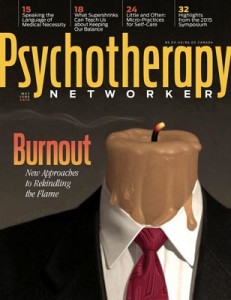The world seems to be in the midst of a pandemic of burnout, spread across all age groups, genders, professions, and cultures. Research specific to mental health providers finds that between 21 and 67 percent may be experiencing high levels. Other related “conditions” have been identified, including compassion fatigue (CF), vicarious traumatization (VT), and secondary traumatic stress (STS), all aimed at describing the negative impact that working in human services can have on mental and physical health.
An entire industry of authors, coaches, and trainers has sprung up to address the problem, providing books, videos, presentations, retreats, and organizational consultation. There’s only one problem: currently fashionable approaches to burnout don’t work. In fact, they may make it worse!
What can be done? In an article published in the Psychotherapy Networker, my long time colleague and co-writer, Dr. Mark Hubble, and I review research on the field’s Top Performing therapists. Once again, they have something to teach us, this time about “healing the heart of the healer.” Click here to access a PDF of the article.


